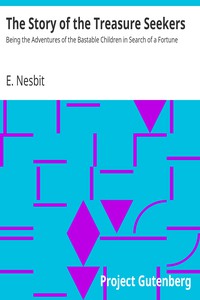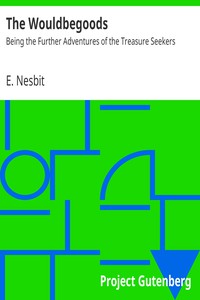The Story of the Treasure Seekers<br />Being the Adventures of the Bastable Children in Search of a, E. Nesbit [top ten books to read txt] 📗

- Author: E. Nesbit
Book online «The Story of the Treasure Seekers<br />Being the Adventures of the Bastable Children in Search of a, E. Nesbit [top ten books to read txt] 📗». Author E. Nesbit
Then Dicky said, ‘Why shouldn’t we borrow it?’ So we said, ‘Who from?’ and then he read this out of the paper—
MONEY PRIVATELY WITHOUT FEES THE BOND STREET BANK Manager, Z. Rosenbaum. Advances cash from L20 to L10,000 on ladies’ or gentlemen’s note of hand alone, without security. No fees. No inquiries. Absolute privacy guaranteed.‘What does it all mean?’ asked H. O.
‘It means that there is a kind gentleman who has a lot of money, and he doesn’t know enough poor people to help, so he puts it in the paper that he will help them, by lending them his money—that’s it, isn’t it, Dicky?’
Dora explained this and Dicky said, ‘Yes.’ And H. O. said he was a Generous Benefactor, like in Miss Edgeworth. Then Noel wanted to know what a note of hand was, and Dicky knew that, because he had read it in a book, and it was just a letter saying you will pay the money when you can, and signed with your name.
‘No inquiries!’ said Alice. ‘Oh—Dicky—do you think he would?’
‘Yes, I think so,’ said Dicky. ‘I wonder Father doesn’t go to this kind gentleman. I’ve seen his name before on a circular in Father’s study.’
‘Perhaps he has.’ said Dora.
But the rest of us were sure he hadn’t, because, of course, if he had, there would have been more money to buy nice things. Just then Pincher jumped up and knocked over the painting-water. He is a very careless dog. I wonder why painting-water is always such an ugly colour? Dora ran for a duster to wipe it up, and H. O. dropped drops of the water on his hands and said he had got the plague. So we played at the plague for a bit, and I was an Arab physician with a bath-towel turban, and cured the plague with magic acid-drops. After that it was time for dinner, and after dinner we talked it all over and settled that we would go and see the Generous Benefactor the very next day. But we thought perhaps the G. B.—it is short for Generous Benefactor—would not like it if there were so many of us. I have often noticed that it is the worst of our being six—people think six a great many, when it’s children. That sentence looks wrong somehow. I mean they don’t mind six pairs of boots, or six pounds of apples, or six oranges, especially in equations, but they seem to think you ought not to have five brothers and sisters. Of course Dicky was to go, because it was his idea. Dora had to go to Blackheath to see an old lady, a friend of Father’s, so she couldn’t go. Alice said she ought to go, because it said, ‘Ladies and gentlemen,’ and perhaps the G. B. wouldn’t let us have the money unless there were both kinds of us.
H. O. said Alice wasn’t a lady; and she said he wasn’t going, anyway. Then he called her a disagreeable cat, and she began to cry.
But Oswald always tries to make up quarrels, so he said—
‘You’re little sillies, both of you!’
And Dora said, ‘Don’t cry, Alice; he only meant you weren’t a grown-up lady.’
Then H. O. said, ‘What else did you think I meant, Disagreeable?’
So Dicky said, ‘Don’t be disagreeable yourself, H. O. Let her alone and say you’re sorry, or I’ll jolly well make you!’
So H. O. said he was sorry. Then Alice kissed him and said she was sorry too; and after that H. O. gave her a hug, and said, ‘Now I’m really and truly sorry,’ So it was all right.
Noel went the last time any of us went to London, so he was out of it, and Dora said she would take him to Blackheath if we’d take H. O. So as there’d been a little disagreeableness we thought it was better to take him, and we did. At first we thought we’d tear our oldest things a bit more, and put some patches of different colours on them, to show the G. B. how much we wanted money. But Dora said that would be a sort of cheating, pretending we were poorer than we are. And Dora is right sometimes, though she is our elder sister. Then we thought we’d better wear our best things, so that the G. B. might see we weren’t so very poor that he couldn’t trust us to pay his money back when we had it. But Dora said that would be wrong too. So it came to our being quite honest, as Dora said, and going just as we were, without even washing our faces and hands; but when I looked at H. O. in the train I wished we had not been quite so particularly honest.
Every one who reads this knows what it is like to go in the train, so I shall not tell about it—though it was rather fun, especially the part where the guard came for the tickets at Waterloo, and H. O. was under the seat and pretended to be a dog without a ticket. We went to Charing Cross, and we just went round to Whitehall to see the soldiers and then by St James’s for the same reason—and when we’d looked in the shops a bit we got to Brook Street, Bond Street. It was a brass plate on a door next to a shop—a very grand place, where they sold bonnets and hats—all very bright and smart, and no tickets on them to tell you the price. We rang a bell and a boy opened the door and we asked for Mr Rosenbaum. The boy was not polite; he did not ask us in. So then Dicky gave him his visiting card; it was one of Father’s really, but the name is the same, Mr Richard Bastable, and we others wrote our names underneath. I happened to have a piece of pink chalk in my pocket and we wrote them with that.
Then the boy shut the door in our faces and we waited on the step. But presently he came down and asked our business. So Dicky said—
‘Money advanced, young shaver! and don’t be all day about it!’
And then he made us wait again, till I was quite stiff in my legs, but Alice liked it because of looking at the hats and bonnets, and at last the door opened, and the boy said—
‘Mr Rosenbaum will see you,’ so we wiped our feet on the mat, which said so, and we went up stairs with soft carpets and into a room. It was a beautiful room. I wished then we had put on our best things, or at least washed a little. But it was too late now.
The room had velvet curtains and a soft, soft carpet, and it was full of the most splendid things. Black and gold cabinets, and china, and statues, and pictures. There was a picture of a cabbage and a pheasant and a dead hare that was just like life, and I would have given worlds to have it for my own. The fur was so natural I should never have been tired of looking at it; but Alice liked the one of the girl with the broken jug best. Then besides the pictures there were clocks and candlesticks and vases, and gilt looking-glasses, and boxes of cigars and scent and things littered all over the chairs and tables. It was a wonderful place, and in the middle of all the splendour was a little old gentleman with a very long black





Comments (0)